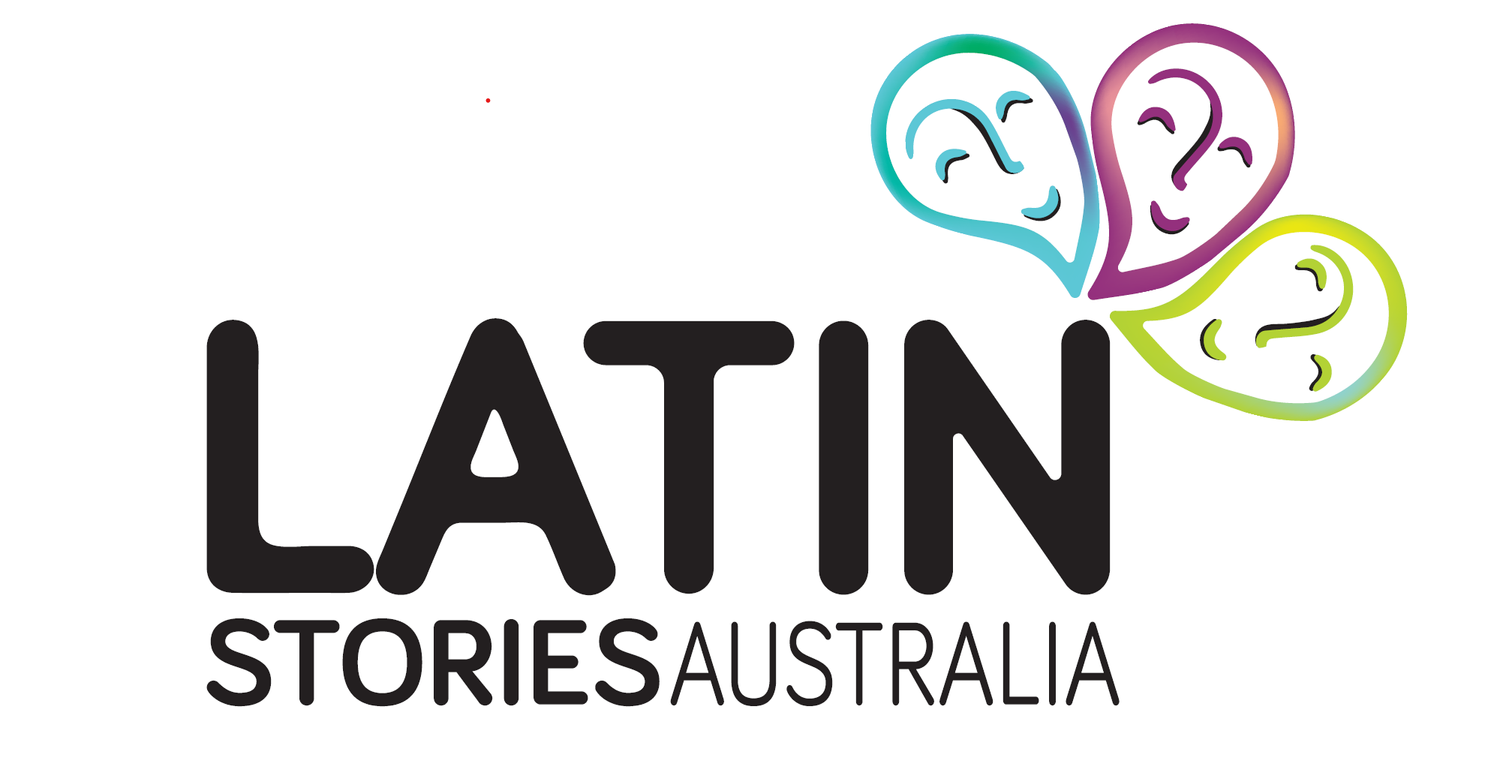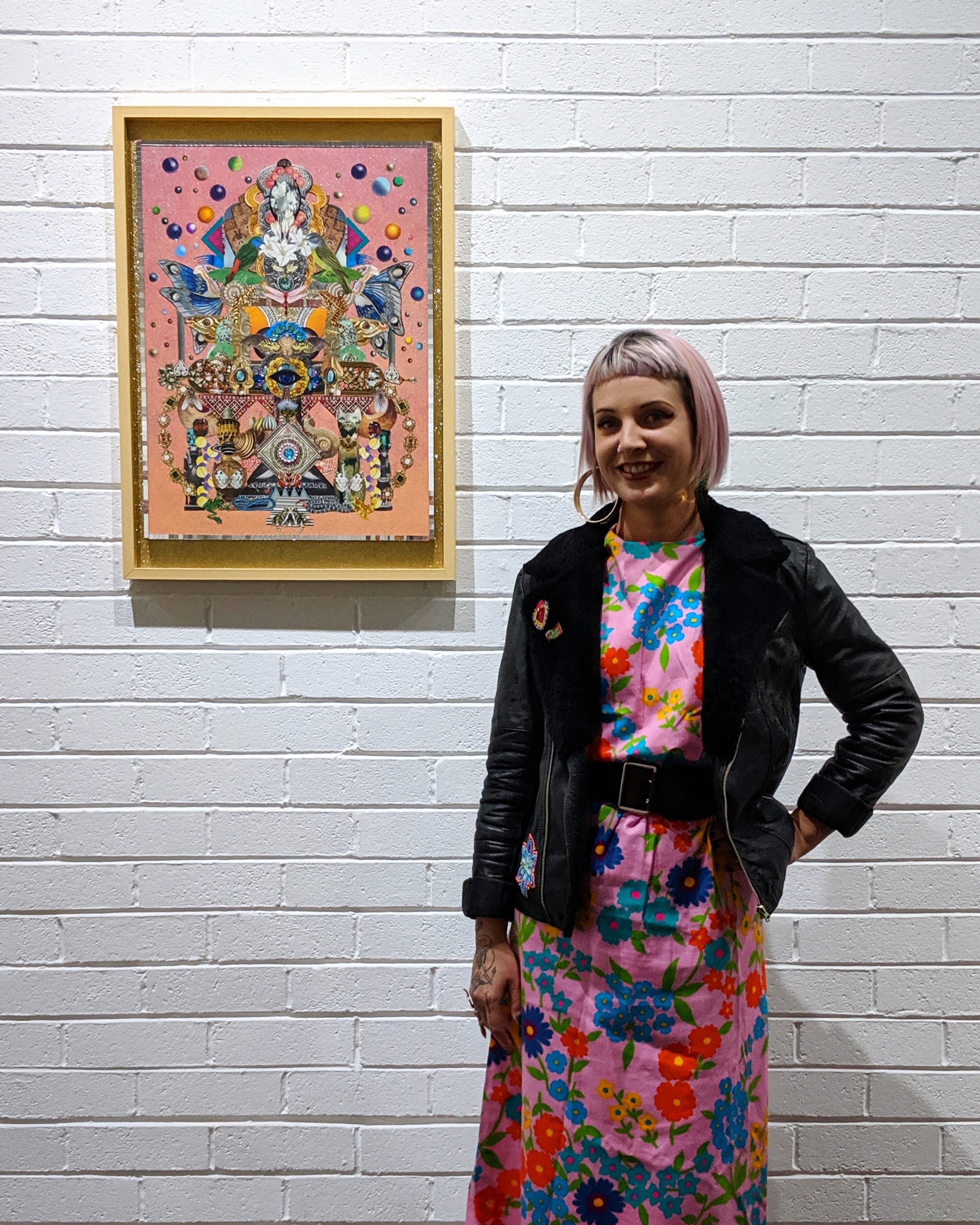Arcana Exhibition: an interview with the artists to explore concepts of identity, inclusion and stereotypes.
Arcana Exhibition is a collective project between migrant artists Katherine Gailer (Colombia), Lucy Awol (France) and Rachael Edwards (UK).
The exhibition opens Friday 4th October 2019 and runs from the 3th to the 8th of October at Marfa Gallery.
By Trini Abascal
Arcana Exhibition is a collective project between migrant artists Katherine Gailer (Colombia), Lucy Awol (France) and Rachael Edwards (UK). The exhibition opens Friday 4th October 2019 and runs from the 3th to the 8th of October at Marfa Gallery. During this exhibition, the artists wave together, each bringing their unique and enriching perspective, to create a powerful message about the feminine power.
This year Latin Stories Australia has been delivering two different series of workshops for women: Interweaving and We are all equal. During these workshops, participants reflect on the concept of identity, inclusion and gender stereotypes. As the three artists of this upcoming exhibition are migrant women, we wanted to hear their perceptions on these concepts and understand how, if any, they have shaped, or are included in, their artistic expressions.
How would you define your identity?
my land has marked my perception of life
Katherine Gailer
Katherine Gailer
I am from Colombia. My land has marked my perception of life, and through this filter I evolve and absorb new worlds. My cultural background has been a blessing to be shared with people in my journey as migrant. South America and Australia are in fact parallel but radically different worlds. Living in Australia has opened my mind and stretched my view to a global community. I have definitely become more adaptable. This ability allows me to connect and collaborate with diverse people with no judgement and no expectation; but rather with a genuine belief that their story is as valuable as mine.
In the past years, I have acknowledged and owned the many colours of my identity. Experiencing the complexity of being strong and fragile at the same time. Embracing the unavoidable flow of change has been at the heart of shaping the woman that I am today. However, I am aware that who I am now will be shaped tomorrow again and again. I also know that sometimes a deep scar will become wisdom that guides you. I am determined to continue a path of an empowered and liberated woman.
Lucy Lucy
I would define my identity as subtly changing and widening constantly over time. As I get older new experiences are shaping me in a more complex way. I keep learning about who and what I am. My identity has had an impact on my experience in Australia, but just as much as my experience in Australia has shaped my identity. It goes both ways.
I am French. Hence, I have a strong French cultural heritage that I unconsciously toned down as I was absorbing the new host culture. I was eager to understand and fit in the Australian way of life. I learned a lot and expanded myself. Being far from home allowed me to dare to believe in dreams of being an artist. This has shaped my identity immensely. However, I feel like I am now reconnecting a bit more with my native tradition.
I am a woman. I felt that being a woman in Australia was at first easier than in France as there is a lot less judgement in how people look and dress. However, things are more complicated that the first impressions. As a female artist I felt that I had to prove a lot more than a male artist. Although, this is probably the same in France.
Rachael Edwards
I don't tend to define my identity and have not often needed to. I understand this as being part and parcel of my privilege: being born a white person in the U.K. I am a woman and I am an artist and I am also an aspiring witch. None of this has changed since migrating to Australia.
How is your identity reflected on your art?
Katherine Gailer
My art is definitely a mixture of delicate work with intuitive/spontaneous expression. I feel I am a little bit like that. I also use different ways of expression in which I tap into different parts of me.
My practice reflects what I am interested in at any given time, but it also shows through who I unconsciously am.
Lucy Lucy
Lucy Lucy
When I meet artists in person after knowing their work, it often strikes me how much they match what they create in one way or another: they kind of craft what they are. In a similar way I paint what I am, not literally but in all the subtle ways. My practice reflects what I am interested in at any given time, but it also shows through who I unconsciously am.
Rachael Edwards
I guess my identity and my art are part of the same thing. My work is very personal. It’s a way for me to make sense of what is going on around me; a way of creating a space I want to exist in; an outward expression of how I want to experience the world; and a form of escapism.
How does your art make you feel included in Australia?
Katherine Gailer
It is interesting to see how much impact our art has in the cultural landscape in Australia. This is an incredible country, where the new generation is a real mix between cultures. I think that as artists we are constantly in touch with the birth of new identities.
Music and art are universal languages through which we offer and receive at a different level. In Australia, art has been a language for me to connect with people.
Lucy Lucy
Australia gave me the opportunity to be an artist and make a living of it. Now, people, galleries and collectors know my work which makes me feel very much included indeed. In France, the weight of history and art history were for me quite heavy to carry. I always felt that if you were an artist it meant that you were some kind of Claude Monet or Marcel Duchamps. In other words, if art was your life, you needed to have a solid style and background as well as knowing very well what you were about. If not, art was just a hobby, a crafty past time. The art culture was at the same time very inspiring and too imposing. In Australia, things are lot younger. I feel that there is less pressure, and therefore I feel more daring and freer. This welcoming and open sensation allowed me to blossom and take part of the Australian art-scape.
Rachael Edwards
I enjoy working in the Melbourne art scene. I have made a lot of friends and connections this way.
How does your art seek to challenge gender stereotypes?
Katherine Gailer
My art aims to empower women and reveal the invisible fabric that connects us with nature. We urgently need to reconstruct our fractured relationship to the environment and ourselves. I like portraying the fierceness and compassion of individuals; and emit back into the world a real Feminine power - which has been repressed for far too long. I believe that challenging gender stereotypes and inequality and empowering communities is the starting point of a new world.
In this show we have allowed ourselves the freedom to create in whatever means feels right for us.
Rachael Edwards
Lucy Lucy
ARCANA is a visual narrative in which the power of the Feminine expands and liberates the intuitive self. The word Arcana refers to mysterious or specialised knowledge, language, or information accessible or possessed only by few or chosen people. So, the show is more about reconnecting to a Feminine source of wisdom which both women and men have within; therefore, challenging gender stereotypes. It is about making space to expose the Feminine way of being which has been muffled over time in contrast with a pragmatic male orientated and factual way of life.
Rachael Edwards
This exhibition seeks to challenge gender stereotypes and inequality in the arts. The arts industry is one of the most sexist industries to work in. As a female artist the odds are always stacked against you. I come from a craft background and my BA is in Embroidery. Applied arts such as this have long been seen as “women’s work”, and therefore not proper art. In this show we have allowed ourselves the freedom to create in whatever means feels right for us. Conceptually, the show deals with ideas such as magic and intuition - for me, these are feminist ideas. Working collaboratively as three female artists is a way of shunning ideas of competitiveness within the arts, and a way to reject the idea that only a chosen few female artists are capable of being successful.
We thank the three artists for sharing part of their identity and experience with us! Don’t miss the opportunity to see this amazing exhibition.





